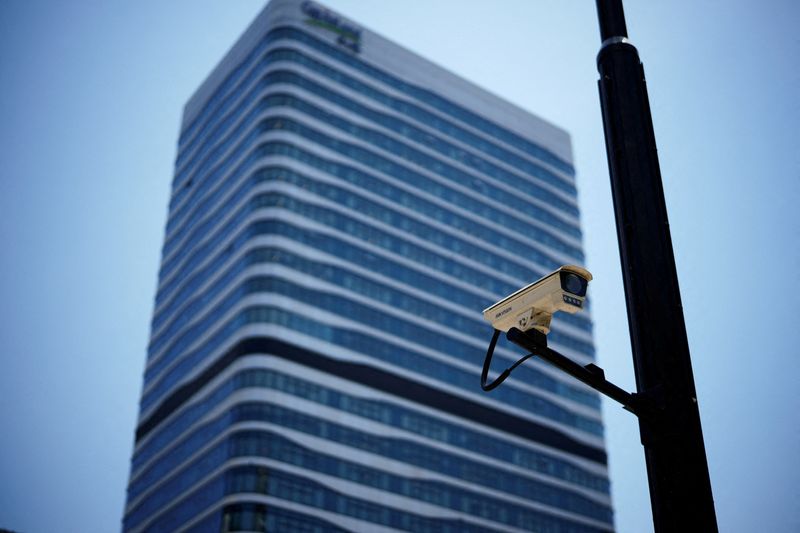Select Language

By James Pomfret and Engen Tham
HONG KONG/SHANGHAI (Reuters) - Some Hong Kong-based staff with U.S. consultancy Mintz Group have left the city after the firm's Beijing office was raided by Chinese police in March, according to two sources with direct knowledge of the matter.
Investigations by Chinese authorities into Mintz, as well as U.S. management consultancy Bain & Co and mainland consultancy Capvision Partners, have sent a chill through companies that deal with China, with many unclear where red lines stand as Beijing prepares to introduce stricter anti-espionage laws in July.
Moving people swiftly out of Hong Kong underscores how the crackdown in China has unnerved some companies in the global financial hub, many of which are still navigating a national security law Beijing imposed on the city in 2020.
The relocations over the last couple of months are meant to be a temporary measure to ensure staff safety, given the uncertainty of the Chinese police probe, the sources said, and involved around half a dozen employees including investigators and the head of the Hong Kong office.
One source with direct knowledge of the matter, and four other sources briefed by Mintz employees, said the firm had engaged in corporate due diligence work examining the possible use of forced labour in supply chains linked to China's Xinjiang region up until this year.
Reuters could not ascertain whether the Chinese police probe was triggered by Mintz's work on Xinjiang. But at least two other senior executives at international due diligence firms operating in China told Reuters authorities had explicitly warned them off such work in recent months.
One of the sources who has dealt with Mintz in a business capacity said several of the Hong Kong-based Mintz employees are now in Singapore, and there is no plan for them to return to Hong Kong until the probe by Chinese authorities is over.
No one was present when Reuters visited the Hong Kong office of Mintz during business hours, with the doors locked and lights off. A building management office employee said Mintz was still paying rent on its office but two employees at neighbouring offices said no one had been seen in the Mintz premises in the past few months.
Several Mintz staff profiles have been removed from Mintz's website, according to a Reuters review of archived versions of the site. It was not clear the roles of all those that had left.
Mintz declined to comment.
Confirming the raid at its Beijing office in late March, Mintz at that time said it had closed its operations there and that it was ready to work with the Chinese authorities to "resolve any misunderstanding that may have led to these events".
XINJIANG 'OFF LIMITS'
While Chinese authorities have not detailed the scope of the investigation against Mintz, the office raid and detentions of five mainland Chinese staffers, including the head of Mintz's Beijing office, have rattled the professional advisory service industry within China, with ripples now being felt in Hong Kong.
As a global financial centre, Hong Kong has a deep pool of professional services talent, including in corporate investigations, with international firms including Kroll, Control Risks, McKinsey and FTI based there.
In recent years, following the enactment of a China-imposed national security law in 2020, the United States has revised its risk assessment for U.S. citizens in Hong Kong, highlighting the heightened risks of arrest, detention, expulsion or prosecution.
Chinese and Hong Kong authorities reject Western criticism of the national security law, saying human rights are respected and all countries, including the United States, need such laws.
China's Public Security Bureau gave no response to Reuters requests for comment. The Ministry of State Security could not be reached for comment.
China's State Council Information Office, the Ministry of Foreign Affairs and the Hong Kong and Macau Affairs Office did not respond to Reuters requests for comment.
The Hong Kong government said it did not comment on individual business decisions.
A spate of laws and regulations enacted during President Xi Jinping's rule - including laws on cybersecurity, personal information protection, data security, as well as the upcoming anti-espionage law that will ban the transfer of any information related to national security - have complicated the landscape for compliance.
Two due diligence executives with international firms and extensive dealings in China said Chinese security officials periodically arranged meetings in recent years to issue explicit warnings on areas to avoid in corporate investigations.
"They would tell us exactly what areas are off-limits," said one executive. "Xinjiang was one of these."
Rights groups accuse Beijing of abuses against mainly Muslim Uyghurs in the western region of Xinjiang, including the mass use of forced labour.
The U.S. has compiled a list of companies it is sanctioning for using forced labour in Xinjiang and has passed a law that puts the onus on companies to prove that goods sourced there are free from forced labour.
China denies abuses in Xinjiang, a major cotton producer and supplier of materials for solar panels.
Mintz's Asia head, Randal Phillips, a former senior CIA official, co-authored an article carried on the firm's website last year on "sanctions due diligence" under the U.S. Uyghur Forced Labour Prevention Act, specific to Xinjiang, which has since been removed.
Phillips wrote "for some suppliers, public records and questionnaires may be sufficient; for others, independent verification, on-the-ground investigation and interviews with industry sources may be called for."
Phillips declined to comment.

